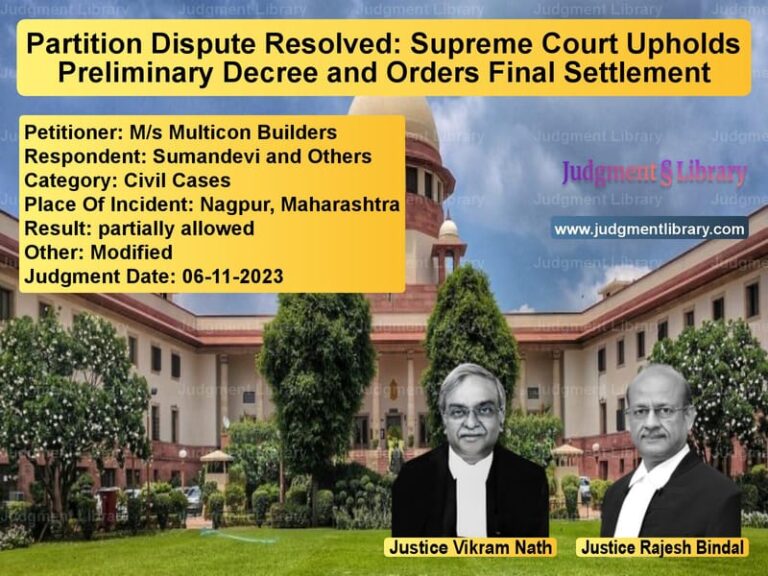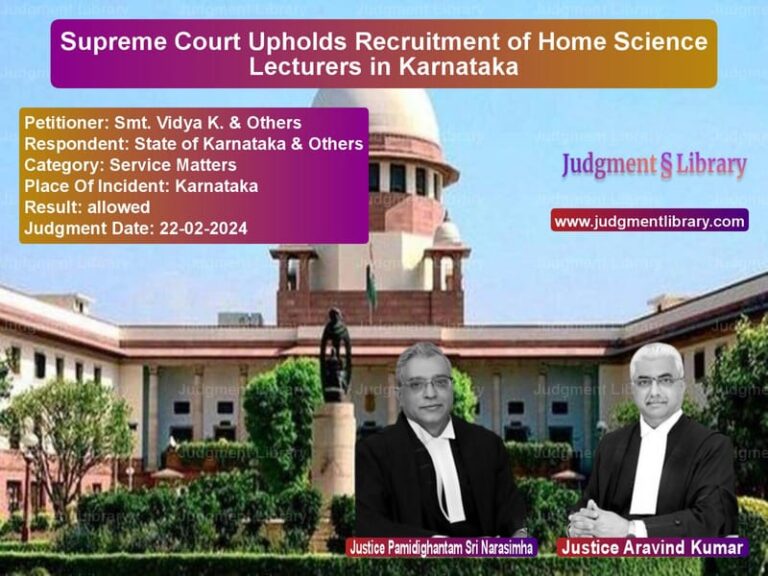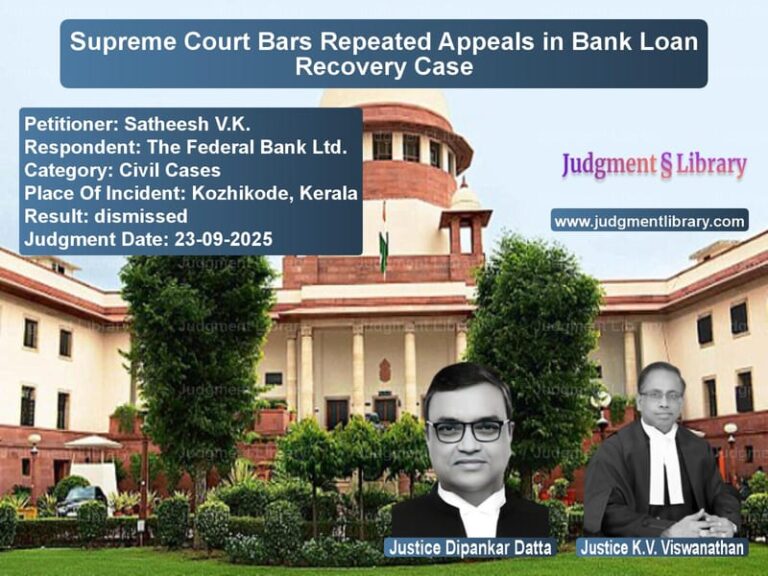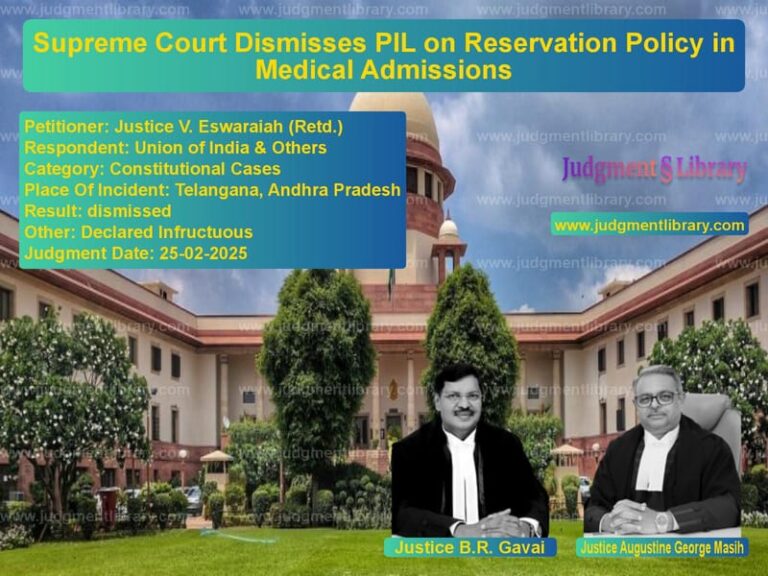Quashing of Criminal Proceedings Reversed: Supreme Court Restores Trial in Attempt to Murder Case
The Supreme Court of India recently delivered a significant judgment in Satish Kumar Jatav v. The State of Uttar Pradesh & Ors., wherein it quashed the order of the Allahabad High Court that had dismissed a criminal case under Section 482 of the Code of Criminal Procedure (CrPC). The case involved serious charges, including attempt to murder (Section 307 IPC), criminal intimidation (Section 506 IPC), and offences under the Scheduled Castes and Scheduled Tribes (Prevention of Atrocities) Act. The ruling reinforces the principle that criminal cases involving serious allegations should not be dismissed summarily without proper judicial reasoning.
Background of the Case
The case stemmed from an incident on September 11, 2004, in Meerut, Uttar Pradesh. The appellant, Satish Kumar Jatav, alleged that he was attacked by the accused persons. When the local police refused to register an FIR, he approached the magistrate under Section 156(3) of CrPC. The magistrate directed the police to lodge an FIR, leading to the registration of Criminal Case No. 7 of 2004.
However, after investigation, the police filed a closure report. The appellant, suspecting foul play and police collusion with the accused, filed a protest petition and initiated a private complaint case (Criminal Complaint Case No. 2365 of 2004). The magistrate, after examining the evidence, issued a summoning order on February 4, 2008, directing the accused to face trial under the following provisions:
- Section 307 IPC (Attempt to Murder)
- Section 504 IPC (Intentional Insult to Provoke Breach of Peace)
- Section 506 IPC (Criminal Intimidation)
- Sections 3(10) and 3(15) of the Scheduled Castes and Scheduled Tribes (Prevention of Atrocities) Act
Allahabad High Court’s Decision
The accused challenged the summoning order before the Allahabad High Court under Section 482 CrPC, seeking quashing of the criminal proceedings. The High Court, in a brief one-paragraph order dated September 16, 2019, quashed the case, stating:
“Considering the facts and circumstances of the case, as noted hereinabove, and also the submissions made by the counsel for the parties, the court is of the considered opinion that no useful purpose shall be served by prolonging the proceedings of the above-mentioned case.”
The High Court did not provide any detailed reasoning for quashing the case, leading to the present appeal before the Supreme Court.
Arguments Before the Supreme Court
Appellant’s (Satish Kumar Jatav’s) Arguments
- The High Court’s order was cryptic and non-reasoned, lacking any discussion on the merits of the case.
- The magistrate had issued the summoning order after due consideration of statements recorded under Sections 200 and 202 CrPC and other material evidence, including the injury report.
- Quashing such a serious criminal case without examining the legality of the summoning order set a dangerous precedent.
Respondents’ (Accused Persons’) Arguments
- The High Court had the power to quash proceedings under Section 482 CrPC if no prima facie case was made out.
- Continuing the trial would cause unnecessary harassment to the accused.
- The High Court had rightly exercised its discretion in quashing the case.
Supreme Court’s Judgment
The Supreme Court, after reviewing the records, held that the High Court’s order was unsustainable. The Court observed:
“The impugned judgment and order passed by the High Court is a cryptic, non-reasoned order. After recording the submissions made by the counsel for the parties, and thereafter by passing one-paragraph order without assigning any further reasons, the High Court has allowed the application under Section 482 CrPC and has quashed the criminal proceedings.”
The Supreme Court emphasized that:
- High Courts must pass speaking and reasoned orders while exercising their powers under Section 482 CrPC.
- Merely stating that “no useful purpose shall be served” is not a valid ground for quashing a criminal case.
- When a magistrate issues summons after due consideration of evidence, the High Court cannot interfere arbitrarily.
Restoration of Criminal Proceedings
The Supreme Court allowed the appeal and restored the trial:
“The order passed by the learned Magistrate summoning the accused is hereby restored.”
This ruling ensures that the accused will now face trial as per the original summoning order.
Impact of the Judgment
This judgment has significant implications for criminal jurisprudence in India:
- It reinforces that High Courts must provide detailed reasoning when quashing criminal cases under Section 482 CrPC.
- It affirms that serious criminal cases, particularly those involving attempt to murder and offenses under the SC/ST Act, should not be dismissed summarily.
- It upholds the principle that victims have a right to a fair trial and cannot be denied justice due to procedural lapses.
Conclusion
The Supreme Court’s ruling in this case is a step towards ensuring judicial accountability and reinforcing the right to a fair trial. The decision sends a clear message that courts must be cautious while quashing criminal cases, particularly those involving grave offenses. With this ruling, the accused must now stand trial, ensuring that justice takes its due course.
Petitioner Name: Satish Kumar Jatav.Respondent Name: The State of Uttar Pradesh & Ors..Judgment By: Justice M. R. Shah, Justice B. V. Nagarathna.Place Of Incident: Meerut, Uttar Pradesh.Judgment Date: 17-05-2022.
Don’t miss out on the full details! Download the complete judgment in PDF format below and gain valuable insights instantly!
Download Judgment: satish-kumar-jatav-vs-the-state-of-uttar-p-supreme-court-of-india-judgment-dated-17-05-2022.pdf
Directly Download Judgment: Directly download this Judgment
See all petitions in Attempt to Murder Cases
See all petitions in SC/ST Act Case
See all petitions in Bail and Anticipatory Bail
See all petitions in Fraud and Forgery
See all petitions in Custodial Deaths and Police Misconduct
See all petitions in Judgment by Mukeshkumar Rasikbhai Shah
See all petitions in Judgment by B.V. Nagarathna
See all petitions in allowed
See all petitions in Quashed
See all petitions in supreme court of India judgments May 2022
See all petitions in 2022 judgments
See all posts in Criminal Cases Category
See all allowed petitions in Criminal Cases Category
See all Dismissed petitions in Criminal Cases Category
See all partially allowed petitions in Criminal Cases Category







